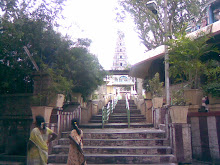Indira and Rajiv had wars with two regions which had the strongest possibilities to claim for a nationhood.
The state s power ensured that these claims were not developed into reality.
In Sri Lanka,the Indian army had an experience of being betrayed by the Sri Lankan state.But,the Tamil army was held responsible for fighting our army.This fight was enabled by the Sri Lankan state.This duplicity was easily forgotten by our establishment which could never allow itself to forget the assasination of Rajiv Gandhi.The nature of the job of governing a billion people makes it inevitable that frictions develop.The INC cannot just watch without reacting to the development of regional forces.The DMK categorically gave up the separatist call in the sixties itself but in Punjab,the vice like hold of religion did not allow for a mature stand and the standoff took place.
The Eelam tamils and their religion and its strength and hold was never understood by our establishment which just put it down to just another extremist outfit.those who were responsible for the decision to send the IPKF should own up their responsibility.the death of Rajiv Gandhi made it possible for the prime people to put the entire onus on the LTTE and pass their mistakes off.
It was a strategic error which left the LTTE cornered and helpless.one sudden moment and they were asked to give up their nationalism and forget that there ever was a fight.The man at the centre,Rajiv,would have felt that it was natural to get a resolution.The intentions would have been honourable and no other way would have suggested itself.The peace keeping force would have occurred to any leader who was committed to resolving the conflict.The Sri Lankan state developed cold feet and instead of taking the wholesome steps required to ensure peace and justice,decided to act against the IPKF.
In Punjab,there was no threat or attack on the religious space.The fundamentalism had no reason to go in for violence.The INC might have believed that the development of regional parties would not be a step in the right direction.That would have been the thinking at the moment and the akalis would have needed patience,which they probably did not have.The rise of bhindranwale would have frustrated the akalis but finally it was bhindranwale himself who turned against the mentor,just like the LTTE did a decade later.
The two moves,in punjab and eelam,were undertaken with the interests of India in mind.When there were consequences,the leaders were the ones who had to bear the brunt of the recoil.
The LTTE had far more convincing reasons to decide to stop the Indian state by attacking the head of the state.it could be argued that it was an act of self defence.
Satwant Singh and Beant Singh were responsible for the deaths of thousands of their fellow sikhs by the manner in which they targeted the prime minister and also for not making the effort to realise that India could not be allowed to stop because bhindranwale had holed up in the golden temple.the actions of the akali dal in not having defused the situation might be due to the fact that bhindranwale was also a threat to them.
The dravidian movement became successful in politics as it was necessary to retain the culture against the hindi control of the state.what happened in Punjab had nothing to do with politics and was all about the attractions of religious fundamentalism in a situation where there was no threat to the religion or the way of life.These were exactly the threats that the eelam tamils faced.
Subscribe to:
Post Comments (Atom)

.jpg)
No comments:
Post a Comment